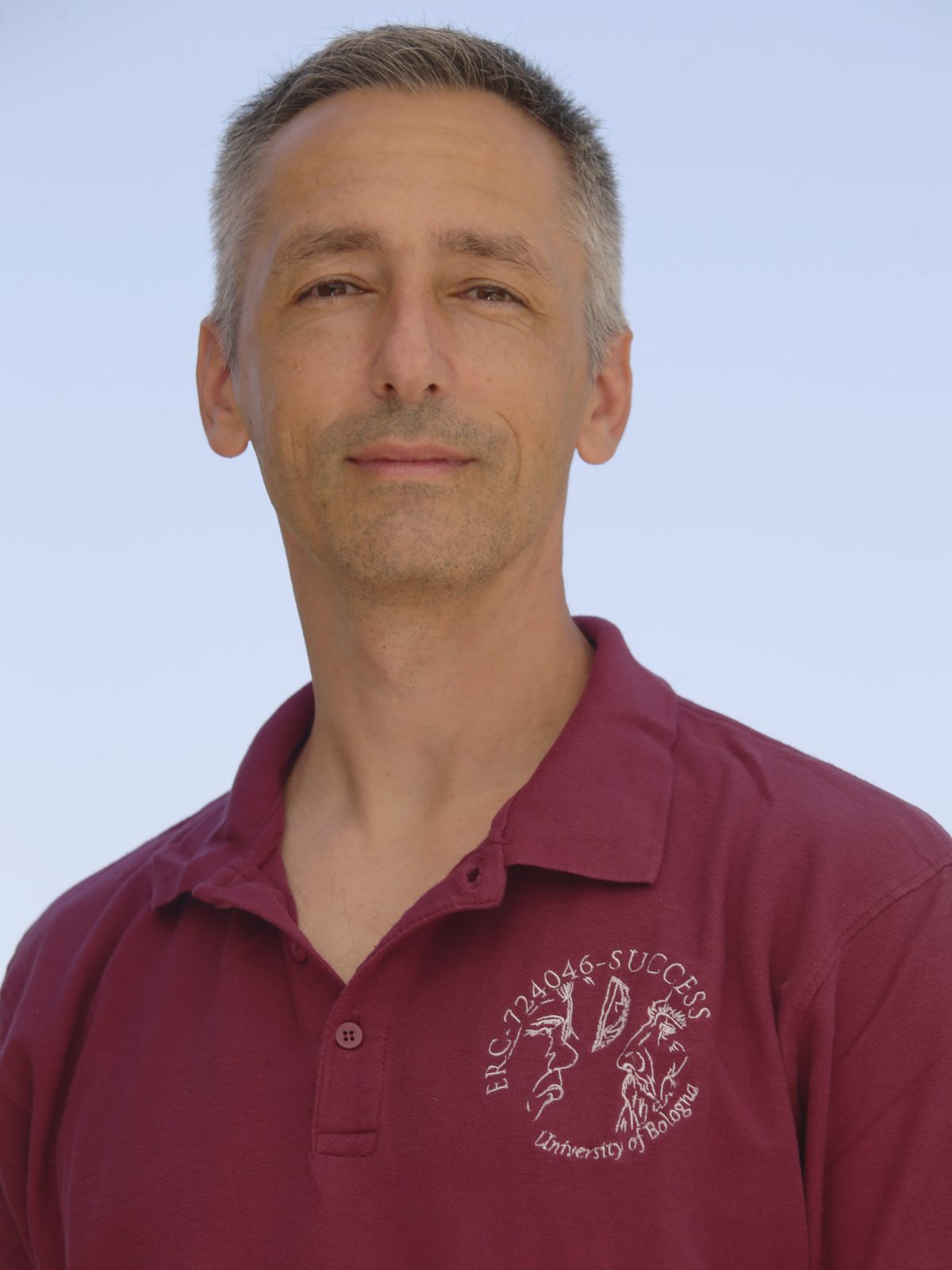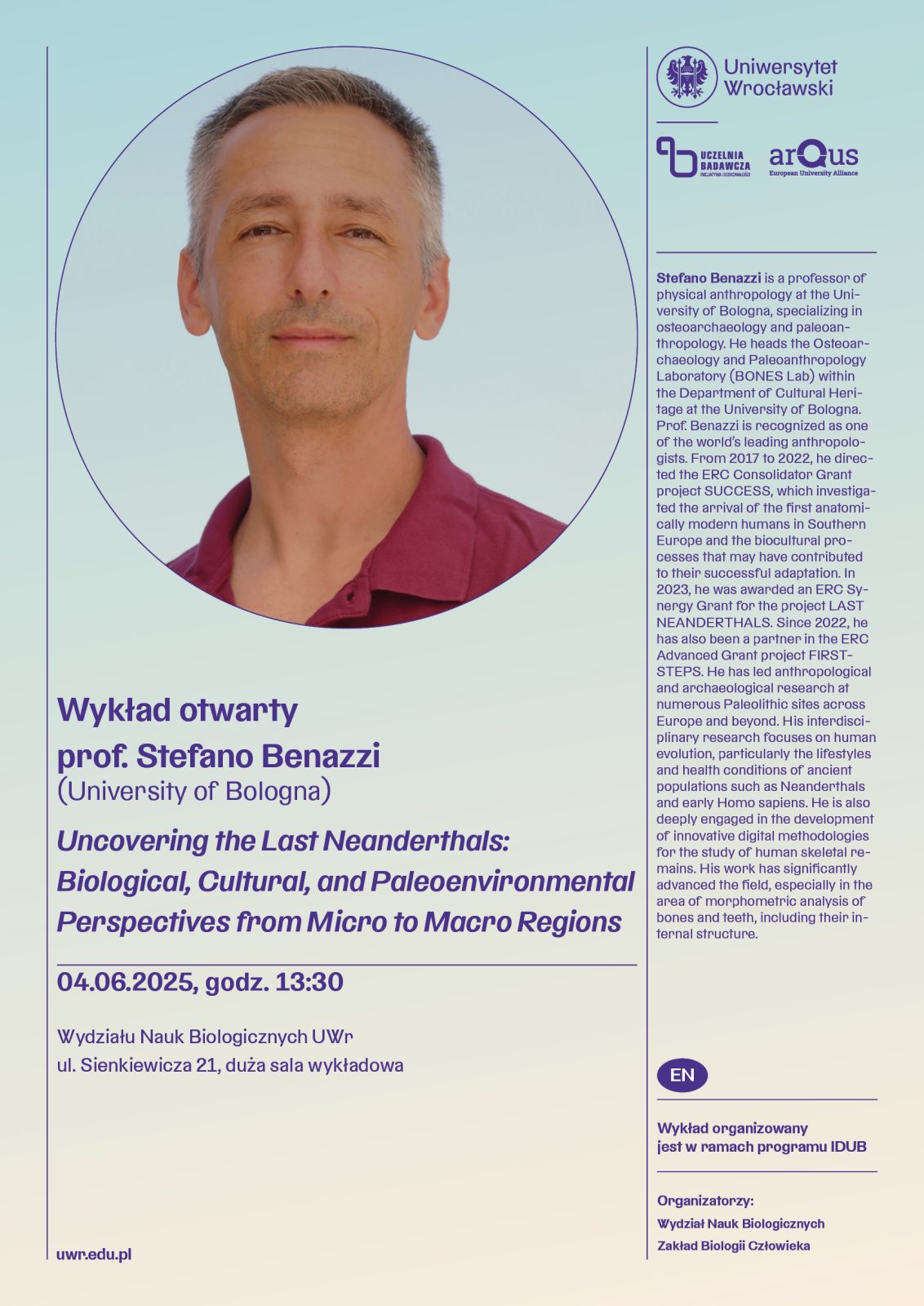
Meeting with Prof. Stefano Benazzi
The Department of Human Biology at the University of Wrocław is honoured to invite you to an open lecture by Professor Stefano Benazzi, a distinguished palaeoanthropologist from the University of Bologna. He is visiting our institution as part of the IDUB Visiting Professor programme.
The lecture, titled “Uncovering the Last Neanderthals: Biological, Cultural, and Paleoenvironmental Perspectives from Micro to Macro Regions”, will take place on Wednesday, 4 June 2025, at 1:30 p.m. in the Large Lecture Hall of the Faculty of Biological Sciences, University of Wrocław, at ul. Sienkiewicza 21.
The event will be conducted in English and is open to all those interested in the topic of human evolution.
About the lecture
Uncovering the Last Neanderthals: Biological, Cultural, and Paleoenvironmental Perspectives from Micro to Macro Regions.
Neanderthals were a human species native to Europe, with the earliest evidence dating back to around 400,000 years ago. Later, their presence was also identified in the Levant and Central Asia. Initially portrayed as primitive beings with limited cognitive abilities, recent research has radically transformed this perception. This shift is due to more rigorous excavation methods, multidisciplinary approaches to the analysis of human remains and archaeological evidence, and the use of innovative technologies.
These new studies reveal a markedly different picture of the Neanderthals, highlighting a human species that was well adapted, both biologically and culturally, to the harsh climates of Europe during the Middle and Upper Pleistocene. This revised perspective raises important questions about the causes of their extinction, which occurred around 40,000 years ago, coinciding with the spread of Homo sapiens across Eurasia. The debate remains highly engaging, attracting not only scientific interest but also widespread public attention, as it reshapes our understanding of our ancient relatives.
In this lecture, we will revisit the key milestones of recent Neanderthal research, drawing also on the findings of the ERC CoG SUCCESS project, which focused on the biocultural dynamics associated with the arrival of Homo sapiens in Italy between 45,000 and 40,000 years ago. We will then introduce the objectives of a new ERC SyG project, which aims to investigate, on a macro-regional scale, the events that occurred between 60,000 and 40,000 years ago and, ultimately, the causes behind Neanderthal extinction.
Bio

Stefana Benazzi is a professor of physical anthropology at the University of Bologna, specializing in osteoarchaeology and paleoanthropology. He heads the Osteoarchaeology and Paleoanthropology Laboratory (BONES Lab) within the Department of Cultural Heritage at the University of Bologna. Prof. Benazzi is recognized as one of the world’s leading anthropologists. From 2017 to 2022, he directed the ERC Consolidator Grant project SUCCESS, which investigated the arrival of the first anatomically modern humans in Southern Europe and the biocultural processes that may have contributed to their successful adaptation. In 2023, he was awarded an ERC Synergy Grant for the project LAST NEANDERTHALS. Since 2022, he has also been a partner in the ERC Advanced Grant project FIRSTSTEPS. He has led anthropological and archaeological research at numerous Paleolithic sites across Europe and beyond. His interdisciplinary research focuses on human evolution, particularly the lifestyles and health conditions of ancient populations such as Neanderthals and early Homo sapiens. He is also deeply engaged in the development of innovative digital methodologies for the study of human skeletal remains. His work has significantly advanced the field, especially in the area of morphometric analysis of bones and teeth, including their internal structure.

Date of publication: 16.05.2025
Added by: M.K.



